
Scammers in Venezuela are selling desperate people non-existent government food aid packages – in the latest episode of the handout program being used to commit fraud.
By Insight Crime
Jan 31, 2022
According to reporting by El Pitazo, victims are contacted over WhatsApp and offered food boxes from the government’s Local Storage and Production Committees (Comités Locales de Abastecimiento y Producción – CLAP). The packages are priced at 50 Venezuelan bolívars, or around $10, though the packages are meant to be handouts for poor Venezuelans.
The scammers attempt to convince potential victims that they are a friend whose phone number has changed, asking them to “add this number and delete the other one.” They also provide photos of the food boxes.
Venezuela’s Criminal Investigations Unit (Cuerpo de Investigaciones Científicas, Penales y Criminalísticas – CICPC) warns that this is just one of many ways cyber scammers are duping Venezuelans.
About a week earlier, in another striking example of criminals exploiting the CLAP system, CICPC agents recovered 1,430 stolen CLAP boxes in Caracas.
InSight Crime Analysis
Created by President Nicolás Maduro to provide food staples to poor Venezuelans, the CLAP system has constantly been subject to profiteering by criminal actors and public officials.
The most notorious example is an alleged kickback and money laundering scheme in which the CLAP system was sold inedible, overpriced food purchased in bulk from México.
US prosecutors have charged a number of people in the scheme, including Colombian businessman Alvaro Pulido who is partners with Maduro financier Álex Saab. Pulido is accused of using a series of shell companies to launder hundreds of millions of dollars of proceeds from CLAP contracts. The shell companies include Hong Kong-based Group Grand Ltd, which provided more than 11.5 million CLAP boxes and is controlled by Saab and Pulido, according to an indictment and the Associated Press.
Also charged in the scheme was Jose Gregorio Vielma-Mora, the former governor of the Venezuelan state of Táchira, who is accused of receiving kickbacks.
Saab, who is currently under arrest in the United States on charges of involvement in a separate corruption case, was previously sanctioned by The US Treasury Department, which accused him of profiting from the overvalued CLAP contracts. Treasury also sanctioned first lady Cilia Flores’ sons, accusing them of involvement in the scheme.
CLAP food aid boxes also have a history of being used to manipulate Venezuelans. In 2018, Venezuelan non-governmental organization Fundación Redes reported that the National Liberation Army (Ejército de Liberación Nacional – ELN), a Colombian guerrilla group with a significant presence in Venezuela, was distributing CLAP boxes with the alleged cooperation of the Venezuelan government.
Similarly, in Caracas, pro-regime armed groups called collectivos profit from CLAP boxes in the neighborhoods they control. As with so many others exploiting the CLAP system, colectivos benefit from a close relationship with the regime, with the members of some groups being high-ranking employees within the CLAP system itself, InfoBae reported in January 2020.
…
Read More: Insight Crime – How criminals take advantage of Venezuela’s food aid system
…

